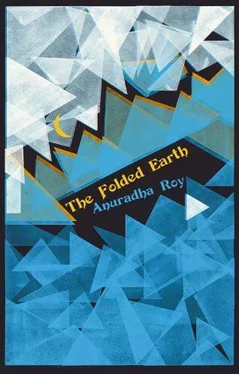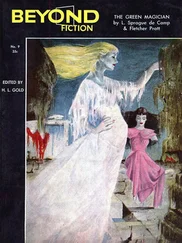“Yes, yes, Diwan Sahib, as I was saying, mysterious are the ways of man.” Mr Qureshi smiled, round-faced, and red-nosed, already a little tipsy. “Do you know, Maya, a car came in for servicing yesterday — a Honda City, belongs to that new doctor at the nursing home, what’s his name? Sharma or Verma. Anyway, the boys started work on the car. They’re strapping young fellows, foul-mouthed and stoned half the time. When they opened the boot to get the spare tyre, right there, one of them almost fell over with fright. There was a head in the boot. Long hair and all.”
“A human head?” I said. “You mean a dead body?”
“Aha, Maya!” Mr Qureshi chuckled. “Scared you, didn’t I? No, when they looked again they realised it was a plastic head, a stand for a wig. There was a wig on it: long curling red hair. Even had two blue hairclips. So what do we do then? Of course we phone the doctor and we say, ‘Sir, you left a wig in your car.’ And the doctor shouts, ‘What wig? What do you take me for? Are you trying to insult me? I have a full head of hair and it’s my own, I’ll come to your workshop and you can pull it if you like and see if it comes off,’ he says, and bangs the phone down, so angry. There is no explanation. None, Diwan Sahib. Correct me if I am wrong, but mysterious are the ways of mankind. I have kept the head in the showroom of the workshop. Maya, you can come and see it if you don’t believe me. What was it doing in the boot? No idea.”
Diwan Sahib said, “Why won’t we believe you? Stranger things than this happened in Surajgarh in my time. Now let me tell you — ”
And Corbett was filed away for another day.
One afternoon, when I came to his lawn with the newspapers, I found Diwan Sahib smoking. I said nothing, but a look passed between us. He took a long, defiant drag and after a pause blew out a lungful of smoke. He tapped his Rolls Royce cigarette case and displayed a neat row of filter tips. If he had been a child he might have stuck his tongue out at me. He had stopped smoking with great difficulty three years earlier. He had sworn then that he was free of the siren call of addiction, and that he would never put himself through stopping again.
I marched into the house and found Veer’s assistant there. He was a limp, shy young man from Dehra Dun, who spent most evenings pacing in the garden murmuring to his wife on a mobile. He was a follower of the Radha Soami sect and cooked his own vegetarian meals, minus even onion and garlic, on a separate gas stove that he had set up on a back veranda. If chicken or fish was cooked in the house, he lit incense sticks by the dozen and his face assumed a rigid expression of martyrdom. He regarded cigarette packets and bottles of gin as objects that had been planted in the house by the Devil in person. He looked horrified when I asked him how Diwan Sahib had laid his hands on cigarettes. “None of us smoke, Maya Mam,” he said. “Some visitor must have left the cigarettes in the house.” They happened to be Diwan Sahib’s old brand too. “What’s a couple of cigarettes after three years?” Diwan Sahib shouted towards us. “Do you think I have no self-control?”
That evening, when I told Ama about the cigarettes, she gave me her all-knowing look and said with a cackle of sarcastic laughter, “Life’s improved for Diwan Sa’ab ever since his nephew came back! So much more to drink, and now cigarettes! The nephew will kill his uncle with trying to make him happy, just you wait and see.” I pretended not to understand what she was implying and busied myself with other work. I did not want her to suppose I was encouraging malice. She had never liked or trusted Veer, and she had told me so in the early days, not thinking he would actually start living at the Light House or that he and I would become friends. She was too politic now to be open about her dislike, but sometimes the temptation was irresistible.
Diwan Sahib lost weight because of eating less and drinking more, and that made him look both younger and frailer. However his eyes, spider-webbed with wrinkles, retained their wicked gleam. One afternoon, a buxom woman from somewhere in East Anglia arrived out of the blue, saying she was writing a love story based on the lives of Edwina Mountbatten and Jawaharlal Nehru. “It is vital to my project, Sir, that I see the letters I believe to be in your possession. If you allow me a day’s access to the papers, I’m willing to share my royalties with you.” She came in a flowing silk sari that repeatedly slid off her shoulder to bare her cleavage, so that, Diwan Sahib later said, two roads converged in a low silk blouse, and he wished he could have travelled both.
When she met with no success the first day — she had installed herself at the Westview Hotel — she returned on each of the next two mornings. Her long black hair was in a bun crested by a red rose one day, a creamy magnolia the next. She sat very straight, adjusted the flower, and looked at Diwan Sahib, focusing her energies through her large pleading eyes. She gifted him a shawl from the local army widows’ co-operative, and, the next day, a bottle of rum.
She tried to talk about Nehru, but Diwan Sahib remorselessly steered the conversation to Corbett. “Did you know,” he said, “that he died the day before Einstein? Einstein stole his thunder. Was Corbett a lesser man than Einstein? If I were lost in the jungles here” — he waved a hand this way and that — ”I hope you are careful when you walk around after dark? And that you know that a slow-moving snake that wriggles as it approaches is very likely a poisonous one? That is when you need Corbett with you, Madam, and not Einstein — when you want someone to be able to tell from looking at scratch marks on rocks, which animals have passed, how far they are from you, why the langur is calling from that tree, why the barking deer leaped away across the path. Do you follow me?”
The woman’s eyes had glazed over, but she nodded.
“But who remembers Corbett now, other than a few senile ancients like me?”
It was only on the afternoon the woman was leaving and had come to say goodbye that Diwan Sahib chose to relent. “Oh, I forgot,” he said, “Nehru came here to Ranikhet with the Mountbattens. He dropped in to see me too — that chair — your chair? He sat on that very chair with a gin and bitters in one hand and a cigarette in the other.”
The woman jumped from her chair, stared at it in disbelief, and scrabbled in her handbag for her camera as Diwan Sahib continued, “Why don’t you drive down to Holm Farm? They have a framed picture there, of Edwina, Dickie, Nehru and Mr Upadhyaya, who presided over the place.” He returned placidly to his newspaper while she gave him a look that combined excitement, impatience, and irritation in equal measure, before rushing off to her driver to consult him about the practicalities of a detour to the Holm Farm Hotel on her way to the station.
Diwan Sahib watched the car disappear into a cloud of dust, then went inside. He poured us both a rum and we sank into our usual chairs. For a while, exhausted with talk, we did not speak. Above the fireplace was a tall vase filled with half-dead pink roses into which Himmat Singh had stuck a few blood-red Aztec lilies. It was so quiet that I thought I could hear when, from time to time, the decaying rose petals dropped onto the mantelpiece. Flames ate at a small log in the fireplace. A fire was lit in that room every day, even on the hottest summer evenings, to kill the damp and protect the books from silverfish.
“The prime minister of a newly independent country,” Diwan Sahib said after a long spell of silence. “Devoted to the wife of his departing Viceroy. Is it a surprise that this woman wants to turn it into a lurid romance?” He emptied half his glass in one gulp. He sighed, tilted his head back on his chair and shut his eyes.
Читать дальше












